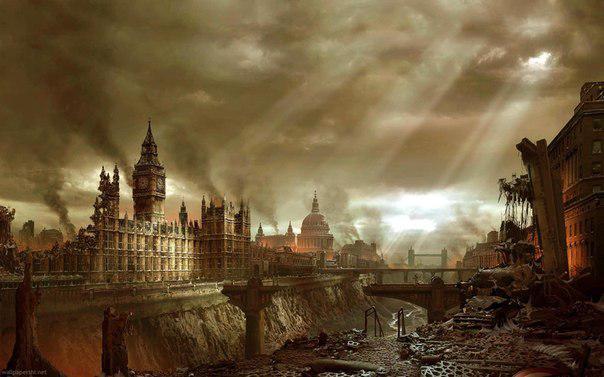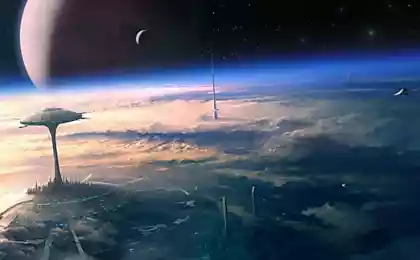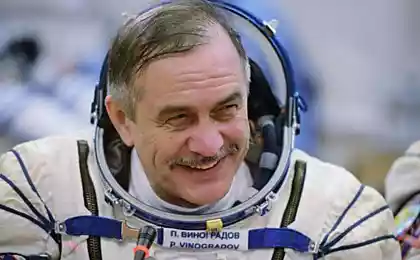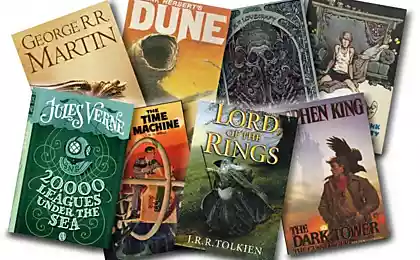1026
9, the most iconic science fiction in the West
1. "The Time Machine", HG Wells
The book describes the journey of the inventor of the time machine into the future. The plot - the adventures of the protagonist in the world, located in 800 thousand years, describing that the author started with the negative trends in the development of contemporary capitalist society that has allowed many critics called the book a novel-warning. In addition, the novel was first described many ideas related to time travel, which for a long time will not lose its attractiveness for readers and authors of new works.
2. "Stranger in a Strange Land," Robert A. Heinlein
The first expedition to Mars has disappeared without a trace. The third world war pushed second, successful, long expedition to the twenty-five years. New researchers have established contact with the native Martians and discovered that the first expedition was lost, not all. And the earth brought "Mowgli space age" - Michael Smith Vallentyne, educated local sentient beings. A man and a Martian origin for education, Michael bursts into a bright star in the usual routine of the Earth. Endowed with the knowledge and skills of the ancient civilization Smith becomes the messiah, the founder of a new religion and the first martyr for his faith ...
3. "2001: A Space Odyssey," Arthur C. Clarke
The film "2001: A Space Odyssey" regularly include a list of "greatest films in cinema history." He and his sequel "2010: Odyssey 2" received the award "Hugo" in 1969 and 1985 as the best science fiction films. The impact of the film and the book on contemporary culture is huge, as the number of their fans. And although 2001 has already begun, "Space Odyssey" is unlikely to be forgotten. It continues to be our future.
4. "Fahrenheit 451," Ray Bradbury
The epigraph of the novel says that the ignition temperature of paper - 451 ° F. The novel describes a society that is based on the popular culture and consumer thinking, in which all of the books, forcing to think about life, to be burned, keeping the books is a crime, and people who can think critically, are outlawed. The protagonist of the novel, Guy Montag, is working "fire" (in the book involves the burning of books), being sure that gets the job done "for the benefit of mankind." But soon he was disappointed in the ideals of society, part of which is becoming an outcast and joins a small group of marginalized underground, whose supporters memorize texts of the books, in order to save them for posterity.
5. "Reason" (other names - "Academy", the "Fund", "foundation", "Foundation of"), Isaac Asimov
According to rumors, Asimov made a huge impression on Osama bin Laden and even influenced his decision to set up a terrorist organization "Al Qaeda". Bin Laden himself likened Gary Seldon, who manages the company through pre-planned future crises. Moreover, the title of the novel, translated into Arabic sounds like Al Qaida, and thus could give rise to the name of bin Laden's organization.
6. "Slaughterhouse-Five" by Kurt Vonnegut
The main character - an American soldier Billy Pilgrim, an absurd, timid, apathetic people. The book describes his adventures in the war and the bombing of Dresden, which has left an indelible imprint on the mental state of Pilgrim, a child is not very stable. Vonnegut introduced the story of the fantastic element: life experiences of the protagonist are considered through the prism of post-traumatic stress disorder - a syndrome characteristic of the war veterans, who mutilated hero perception of reality. As a result, a comic "tale about aliens" grows into a certain harmonious philosophical system.
Aliens from the planet Tralfamadore take Billy Pilgrim to his planet and tell him that the time is not really "flow" is not a gradual random transition from one event to another - world and time once and for all are known to all that has happened and will happen . On someone's death trafalmadortsy simply say: "These things". We can not say why or why something happened - this was "the structure of the time».
7. "Dune" by Frank Herbert
This book raises many political, environmental and other important issues. The writer was able to create a complete fantasy world and cross it with a philosophical novel. In this world, the most important ingredient - the spice that is needed for interstellar travel and on which depends the existence of civilization. This substance is only on one planet called Arrakis. Arrakis is a wilderness inhabited by huge sand worms. On this planet live Fremen tribes whose lives are basic and absolute value is water.
8. & quot; Neuromancer & quot ;, William Gibson
The novel by William Gibson, a canonical work in the genre of "cyberpunk," award-winning "Nebula" (1984), "Hugo" (1985) and "Prize Philip K. Dick." It is Gibson's first novel, which opens the trilogy "Cyberspace." Published in 1984.
This work examined concepts such as artificial intelligence, virtual reality, genetic engineering, multinational corporations, cyber (computer network matrix) long before these concepts became popular in popular culture.
9. "The Gates," Frederik Pohl
Some people have found Venus artificial asteroid, built an alien race, called the Heechee. At the same asteroid discovered spaceships. People figured out how to operate the ships, but they could not change the destination. Many volunteers have experienced them. Some returned with openings through which becomes richer. But the majority returned with nothing. And some did not come back at all. Flying on the ship looked like a Russian Roulette - might get lucky, but it was possible to die. The main character - a researcher who got lucky. His remorse - of the crew, who had the good fortune, returned it alone. And he tries to understand his life, confessing robot psychoanalyst.

The book describes the journey of the inventor of the time machine into the future. The plot - the adventures of the protagonist in the world, located in 800 thousand years, describing that the author started with the negative trends in the development of contemporary capitalist society that has allowed many critics called the book a novel-warning. In addition, the novel was first described many ideas related to time travel, which for a long time will not lose its attractiveness for readers and authors of new works.
2. "Stranger in a Strange Land," Robert A. Heinlein
The first expedition to Mars has disappeared without a trace. The third world war pushed second, successful, long expedition to the twenty-five years. New researchers have established contact with the native Martians and discovered that the first expedition was lost, not all. And the earth brought "Mowgli space age" - Michael Smith Vallentyne, educated local sentient beings. A man and a Martian origin for education, Michael bursts into a bright star in the usual routine of the Earth. Endowed with the knowledge and skills of the ancient civilization Smith becomes the messiah, the founder of a new religion and the first martyr for his faith ...
3. "2001: A Space Odyssey," Arthur C. Clarke
The film "2001: A Space Odyssey" regularly include a list of "greatest films in cinema history." He and his sequel "2010: Odyssey 2" received the award "Hugo" in 1969 and 1985 as the best science fiction films. The impact of the film and the book on contemporary culture is huge, as the number of their fans. And although 2001 has already begun, "Space Odyssey" is unlikely to be forgotten. It continues to be our future.
4. "Fahrenheit 451," Ray Bradbury
The epigraph of the novel says that the ignition temperature of paper - 451 ° F. The novel describes a society that is based on the popular culture and consumer thinking, in which all of the books, forcing to think about life, to be burned, keeping the books is a crime, and people who can think critically, are outlawed. The protagonist of the novel, Guy Montag, is working "fire" (in the book involves the burning of books), being sure that gets the job done "for the benefit of mankind." But soon he was disappointed in the ideals of society, part of which is becoming an outcast and joins a small group of marginalized underground, whose supporters memorize texts of the books, in order to save them for posterity.
5. "Reason" (other names - "Academy", the "Fund", "foundation", "Foundation of"), Isaac Asimov
According to rumors, Asimov made a huge impression on Osama bin Laden and even influenced his decision to set up a terrorist organization "Al Qaeda". Bin Laden himself likened Gary Seldon, who manages the company through pre-planned future crises. Moreover, the title of the novel, translated into Arabic sounds like Al Qaida, and thus could give rise to the name of bin Laden's organization.
6. "Slaughterhouse-Five" by Kurt Vonnegut
The main character - an American soldier Billy Pilgrim, an absurd, timid, apathetic people. The book describes his adventures in the war and the bombing of Dresden, which has left an indelible imprint on the mental state of Pilgrim, a child is not very stable. Vonnegut introduced the story of the fantastic element: life experiences of the protagonist are considered through the prism of post-traumatic stress disorder - a syndrome characteristic of the war veterans, who mutilated hero perception of reality. As a result, a comic "tale about aliens" grows into a certain harmonious philosophical system.
Aliens from the planet Tralfamadore take Billy Pilgrim to his planet and tell him that the time is not really "flow" is not a gradual random transition from one event to another - world and time once and for all are known to all that has happened and will happen . On someone's death trafalmadortsy simply say: "These things". We can not say why or why something happened - this was "the structure of the time».
7. "Dune" by Frank Herbert
This book raises many political, environmental and other important issues. The writer was able to create a complete fantasy world and cross it with a philosophical novel. In this world, the most important ingredient - the spice that is needed for interstellar travel and on which depends the existence of civilization. This substance is only on one planet called Arrakis. Arrakis is a wilderness inhabited by huge sand worms. On this planet live Fremen tribes whose lives are basic and absolute value is water.
8. & quot; Neuromancer & quot ;, William Gibson
The novel by William Gibson, a canonical work in the genre of "cyberpunk," award-winning "Nebula" (1984), "Hugo" (1985) and "Prize Philip K. Dick." It is Gibson's first novel, which opens the trilogy "Cyberspace." Published in 1984.
This work examined concepts such as artificial intelligence, virtual reality, genetic engineering, multinational corporations, cyber (computer network matrix) long before these concepts became popular in popular culture.
9. "The Gates," Frederik Pohl
Some people have found Venus artificial asteroid, built an alien race, called the Heechee. At the same asteroid discovered spaceships. People figured out how to operate the ships, but they could not change the destination. Many volunteers have experienced them. Some returned with openings through which becomes richer. But the majority returned with nothing. And some did not come back at all. Flying on the ship looked like a Russian Roulette - might get lucky, but it was possible to die. The main character - a researcher who got lucky. His remorse - of the crew, who had the good fortune, returned it alone. And he tries to understand his life, confessing robot psychoanalyst.
























